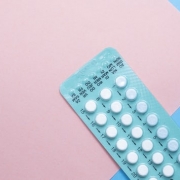You have probably read a headline somewhere or maybe you have even experienced it yourself, there is no doubt that birth control can have side effects like hair loss. Some women when they are taking the pill experience hair loss, while others don’t until several weeks after they stop taking it.
As with any medication, it can be difficult to determine if contraception is the culprit for the hair loss. Here are some possible connection and what you can do about it.
How can the birth control pill cause hair loss?
The American Hair Loss Association says that birth control pills have clinically proven to be safe and effective. However, they do recognizes the negative effects they can have on normal hair growth, especially for those women that have a history of hair loss in their family.
If a woman is sensitive to the hormones contained in contraceptive pills, that can create a hair loss issue. The reason for that is it can disrupt the normal hair growth cycle of your hair.
Your hair grows in phases which are: Active, Transitional, and Resting. Birth control pills can cause your hair to move from the active growth phase to the resting phase much sooner than it should. This results in a large portion of hair growth but also the hair falls out at a pace that is far too quick for the hair regrowth.
For women that are sensitive to hormonal-related hair loss, the pill suppresses the ovulation, the hormonal changes taking place in the body can increase the chances of hair loss weeks or even months after a woman stops taking the pill.
When hair loss is the result of high levels of estrogen, that increases the cell turnover and speeds up the entire cycle, it’s medically termed telogen effluvium. Often treatment isn’t required as your body will eventually adjust to the higher estrogen levels.
What can you do about hair loss?
If you suspect you are having hair loss that is due to taking the contraceptive pill, you should talk to your doctor before stopping. It might be possible that simply changing to a lower-dose pill or finding another form of contraception might resolve your issue.
By taking pro-active steps to take care of your hair and avoid chemical-based treatment and taking care when styling your hair can all help as your body adjusts to your body adjusts hormonally. You can help promote healthy hair growth by making changes to your diet and eating sufficient minerals, and vitamins like zinc and B vitamins.
If you are looking to do something about your hair loss to get your hair back there are a number of treatments available like EHT Hair Loss Treatment therapy, hair extensions, human hair wigs. Talk to one of hair loss specialists to see what options are right for you and the hair loss you have.


